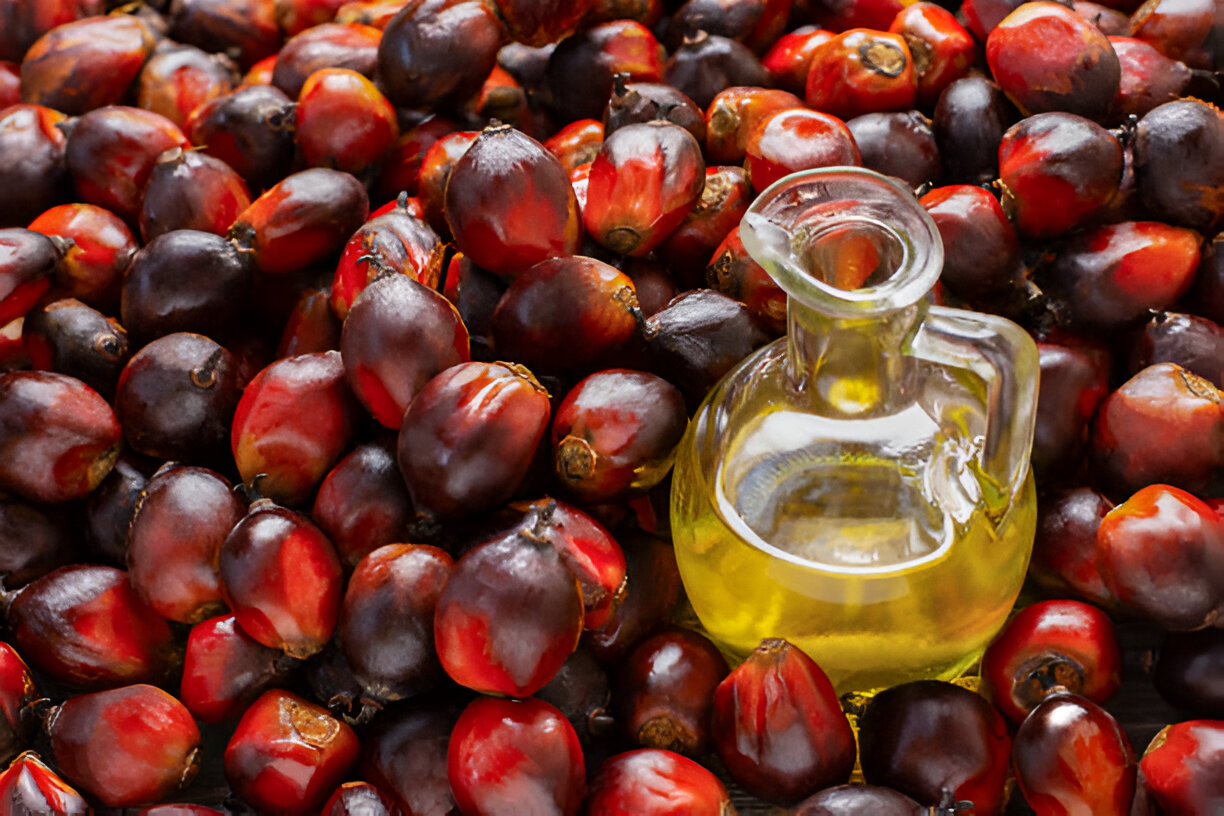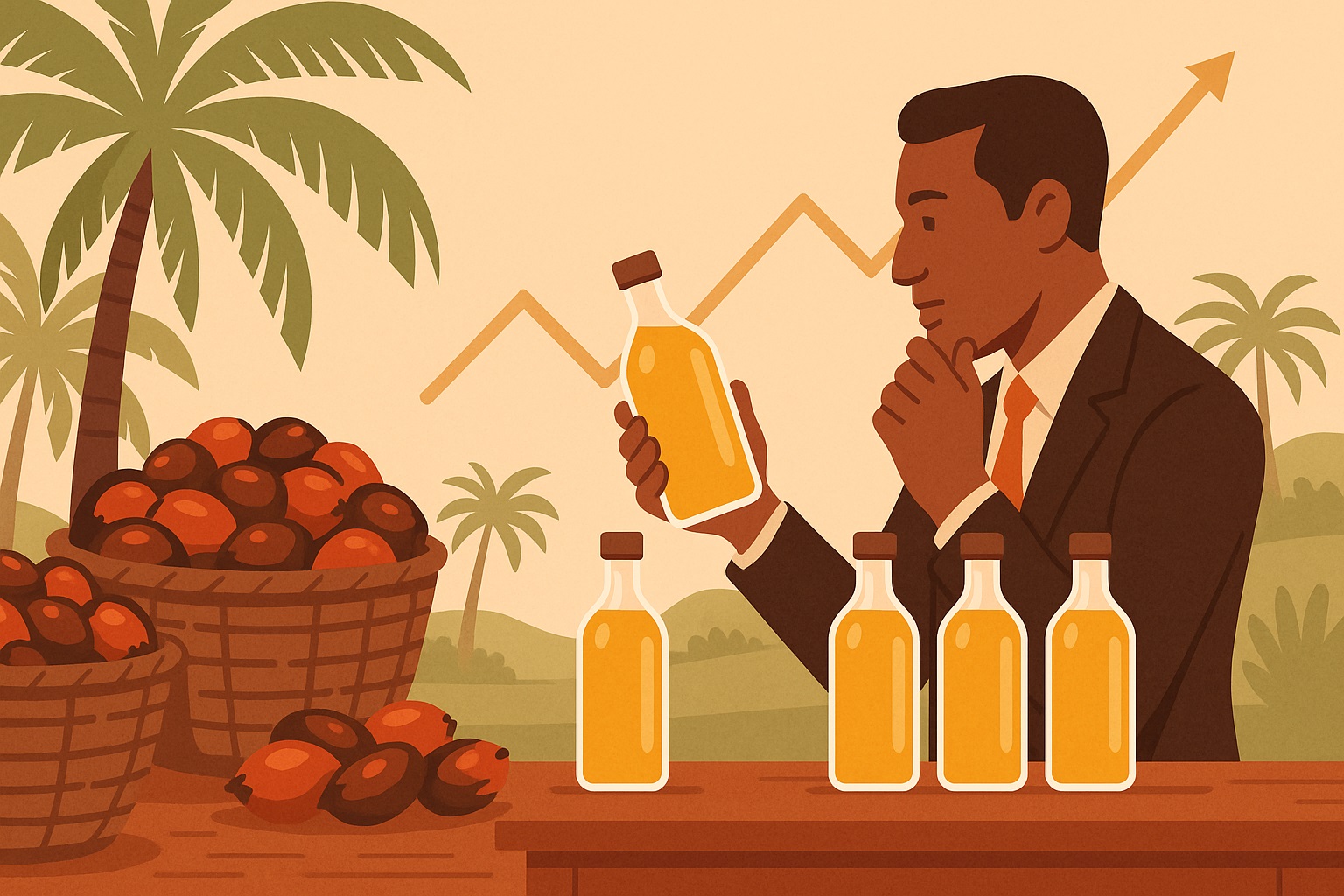The palm kernel oil (PKO) business in Nigeria is a hidden gem that many overlook until they see the profits rolling in. With Nigeria producing an estimated 393 thousand metric tons of PKO in 2023 and earning N4.62 billion from exports in 2024, the industry is thriving and poised for further growth in 2025. From local soap makers to large cosmetic and food industries, the demand for PKO is steady, making it a lucrative opportunity for entrepreneurs. Whether you’re a student seeking a side hustle, a trader looking to diversify, or a job seeker ready to take charge, this business can be your ticket to financial success if approached strategically. This guide provides a detailed roadmap to starting a profitable PKO business in Nigeria, even with limited capital, tailored for 2025 market conditions.
Key Points
- High Demand: PKO is widely used in soaps, cosmetics, cooking, and biodiesel, ensuring a stable market.
- Multiple Entry Points: Start with low-capital options like resale or kernel cracking, or scale to production and export.
- Profit Potential: Processing one ton of palm kernels can yield over ₦200,000 in profit.
- Challenges Exist: Fluctuating prices, adulterated oil, and logistics issues require careful planning.
- Growth Opportunities: Branding, diversification, and exports can significantly boost earnings.
Why Choose the PKO Business?
The PKO industry leverages Nigeria’s natural advantage as one of Africa’s top palm oil producers. Its versatility across industries and growing export potential make it a sustainable venture. With minimal capital, you can enter the market and scale over time, making it accessible for beginners and seasoned entrepreneurs alike.
Getting Started
To start, choose a business model that matches your budget and goals, such as reselling PKO or cracking kernels. Source materials from key regions like Edo or Delta, and focus on building a network of reliable buyers. With proper planning, you can navigate challenges like price fluctuations and ensure consistent profits.
Next Steps
Begin by researching local markets, connecting with suppliers, and testing small-scale operations. As you gain experience, reinvest profits to scale into production or exports. This guide will walk you through each step to ensure success.
Comprehensive Guide to Starting a Profitable Palm Kernel Oil Business in Nigeria (2025 Edition)
The palm kernel oil (PKO) business is a sleeper hit in Nigeria’s agribusiness sector, often overshadowed by more visible ventures like tech or retail. Yet, its steady demand and export potential make it a goldmine for those who understand its dynamics. In 2023, Nigeria produced approximately 393 thousand metric tons of PKO, a figure that has grown by 88 thousand metric tons since 2010, according to Statista. In 2024, PKO exports generated N4.62 billion, highlighting its role as a foreign exchange earner (Businessday NG). This guide provides a step-by-step roadmap to starting and scaling a profitable PKO business in Nigeria, tailored for 2025. Whether you’re starting with ₦100,000 or aiming for a multi-million naira operation, this post covers everything you need to succeed.
Understanding the Palm Kernel Oil Business
Palm kernel oil is extracted from the seed (kernel) of the oil palm fruit, distinct from red palm oil, which comes from the fruit’s fleshy part. PKO is pale yellow, lightweight, and versatile, used in:
- Industrial soaps and detergents: A key ingredient for local and international manufacturers.
- Cosmetics: Found in creams, lotions, and skincare products due to its moisturizing properties.
- Cooking: Popular in rural areas for its affordability and nutritional value.
- Biodiesel: An emerging market as Nigeria explores renewable energy options.
Unlike red palm oil, which is primarily for household consumption, PKO’s industrial applications make it a B2B powerhouse. Its demand spans local soap makers, cosmetic companies, and international markets, particularly in Europe and Asia, where organic and crude PKO is sought after. This versatility ensures a stable market, with opportunities for both small-scale traders and large producers.
Different Models in the PKO Business
The PKO value chain offers multiple entry points, allowing you to choose a model based on your capital, resources, and goals:
- Palm Kernel Cracking & Separation
- Description: Purchase palm kernel nuts, crack them to separate the kernels from the shells, and sell the kernels to oil extractors. Shells can be sold as fuel for bio-briquettes or as a firewood alternative.
- Pros: Low entry cost, decent margins, minimal equipment needed.
- Cons: Labor-intensive, requires access to cracking facilities.
- Best For: Beginners with limited capital (₦200,000 – ₦400,000).
- Oil Extraction (PKO Production)
- Description: Buy palm kernels and process them into PKO using an expeller machine, either at a rented mill or your own setup.
- Pros: High profit potential, especially with bulk buyers like industrial manufacturers.
- Cons: Requires significant investment in machinery (₦900,000+).
- Best For: Entrepreneurs with moderate capital and access to processing facilities.
- PKO Resale (Trading)
- Description: Purchase already-extracted PKO and resell to soap makers, cosmetic companies, or food industries.
- Pros: Low capital requirement, no need for production facilities.
- Cons: Thinner margins compared to production.
- Best For: Those with strong market connections and limited startup funds (₦300,000 – ₦500,000).
- PKO Export
- Description: Export crude or organic PKO to international markets, particularly in Europe and Asia, where demand is growing.
- Pros: Higher profits, access to global markets.
- Cons: Requires substantial capital, certifications, and logistics expertise.
- Best For: Experienced entrepreneurs with ₦5 million+ and export knowledge.
For those starting in 2025, resale or cracking are the most accessible entry points, allowing you to learn the market before scaling to production or exports.
How to Start with Small Capital
If you have less than ₦500,000, you can still enter the PKO business through resale or kernel cracking. Here are two practical models:
Option A: PKO Resale Starter Plan (₦300,000 – ₦500,000)
- Steps:
- Buy 25-litre kegs of PKO at wholesale prices (₦22,000 – ₦27,000 per keg).
- Store in a secure, shaded area to maintain quality.
- Resell to soap makers, market women, or small cosmetic businesses at ₦28,000 – ₦32,000 per keg.
- Profit Calculation:
- Profit per keg: ₦5,000 – ₦10,000
- Selling 20 kegs per week: ₦100,000 – ₦200,000 monthly profit
- Requirements:
- Reliable suppliers (e.g., local mills or wholesalers).
- Storage space (a shaded corner or small warehouse).
- Buyer network (local markets, WhatsApp groups).
Option B: Kernel Cracking & Sale Plan (₦200,000 – ₦400,000)
- Steps:
- Purchase uncracked palm kernel nuts (₦200 – ₦250 per kg).
- Take to local cracking centers (charges vary by region, typically ₦10,000 – ₦20,000 per ton).
- Sell separated kernels at ₦350 – ₦450 per kg.
- Sell cracked shells to fuel producers or farmers.
- Profit Calculation:
- Profit per kg: ₦100 – ₦200
- Selling 1 ton (1,000 kg): ₦100,000 – ₦200,000
- Requirements:
- Access to cracking facilities.
- Transportation for sourcing and delivery.
- Buyer connections for kernels and shells.
Both options allow you to start lean, learn the supply chain, and reinvest profits to scale.
Where to Source Materials in Nigeria
Palm kernel nuts are abundant in Nigeria’s South-South and South-East regions, where oil palm cultivation thrives. Key states include:
- Edo
- Delta
- Akwa Ibom
- Cross River
- Abia
- Imo
- Ondo
- Ogun
Sourcing Options:
- Local Markets: Visit markets in palm-producing areas for direct purchases.
- Palm Oil Mill Settlements: Mills in rural areas often sell kernels at lower prices.
- Online B2B Platforms: Use VConnect or TradeDepot to connect with suppliers.
- Facebook Marketplace: Find middlemen or mills offering kernels.
Best Time to Buy: March to July, during the peak harvest season, when prices are lower due to high supply.
Equipment Needed
For those venturing into PKO production, the following equipment is essential:
| Equipment | Purpose | Cost (₦) |
|---|---|---|
| Palm Kernel Expeller | Extracts oil from kernels | 900,000 – 2,000,000 |
| Nut Crusher & Separator | Cracks nuts and separates shells | 500,000 – 1,500,000 |
| Oil Filter Machine | Purifies oil (optional) | 300,000 – 800,000 |
| Storage Drums/Jerry Cans | Stores and transports oil | 5,000 – 20,000 each |
Starting Small: Use local processing mills that charge per bag or kilo (₦10,000 – ₦20,000 per ton) until you can afford your own equipment.
How to Find Buyers
Securing buyers is critical to avoid inventory pile-up. Here are effective strategies:
- Local Soap & Cosmetic Makers:
- Connect via WhatsApp business groups, local markets, or targeted Facebook ads.
- They typically buy in 25-litre kegs or smaller drums.
- B2B Suppliers (Bulk Buyers):
- Approach companies like PZ, Dangote, or local detergent brands with samples and a professional proposal.
- These buyers often require consistent supply and can offer long-term contracts.
- Online Directories & Marketplaces:
- List products on Jiji.ng, Exporters.NG, or VConnect.com.
- Use WhatsApp status and groups to reach local buyers.
- Export Agents:
- Register with the Nigerian Export Promotion Council (NEPC) and attend export fairs.
- Partner with agents to supply PKO for international markets while building your export capacity.
Profit Estimation
Here’s a breakdown for processing 1 ton of palm kernels:
| Item | Cost/Revenue (₦) |
|---|---|
| Cost of 1 ton of kernels | 220,000 |
| Yield (litres of PKO) | 400 – 450 |
| Selling price per litre | 1,200 – 1,400 |
| Total Revenue | 480,000 – 630,000 |
| Processing Costs (cracking, milling, labor, transport) | 50,000 – 80,000 |
| Gross Profit | 200,000+ |
This profit potential makes PKO production attractive, especially for small factories processing multiple tons monthly.
Challenges and How to Beat Them
The PKO business has challenges, but proactive strategies can mitigate them:
- Fake or Adulterated Oil:
- Problem: Some suppliers mix PKO with cheaper oils, harming quality.
- Solution: Test oil before buying and maintain strict quality control for your brand.
- Fluctuating Prices:
- Problem: Prices vary with seasons and market conditions.
- Solution: Buy in bulk during low-price seasons (March – July) and store a buffer stock.
- Capital-Intensive Equipment:
- Problem: Machinery costs can be prohibitive for beginners.
- Solution: Start with third-party mills or form joint ventures to share costs.
- Poor Road Access:
- Problem: Many palm kernel sources are in rural areas with bad roads.
- Solution: Budget for transportation and partner with reliable logistics providers.
Additional Solutions:
- Start lean and reinvest profits to scale.
- Use digital tools like WhatsApp for marketing and Google Sheets for tracking.
- Focus on consistency and integrity to build a trusted brand.
Scaling the Business
Once you establish steady sales, consider these growth strategies:
- Branding:
- Register your business name and obtain NAFDAC certification for retail packaging.
- Package PKO in branded 5L, 10L, or 25L kegs for supermarkets.
- Diversify Products:
- Expand into black soap production, coconut oil, shea butter blending, or palm kernel cake for animal feed.
- Start a Mini Refinery:
- Invest in a small refining unit to produce refined PKO, which sells at a premium.
- Export Partnerships:
- Connect with international buyers via Alibaba or Tradekey.
- Partner with export agents to handle logistics while you focus on production.
Legal & Registration Process
To build trust and access opportunities like loans or grants, formalize your business:
- Register with the Corporate Affairs Commission (CAC) to legitimize your operations.
- Open a business bank account for transactions.
- Obtain NAFDAC certification if packaging for retail.
- Register with NEPC for export activities.
These steps enhance credibility and open doors to larger markets and partnerships.
Real-Life Success Examples
The PKO business has transformed lives across Nigeria:
- A trader in Delta started with ₦350,000 in 2021, reselling PKO. By 2025, she owns a 2-tonne/day mill, supplying factories in Onitsha.
- A UNIBEN student cracked kernels during holidays, earning enough to cover his tuition fees each semester.
- A father-son duo in Akwa Ibom began supplying cracked kernels and now exports PKO through Lagos port.
These stories show that with dedication, anyone can succeed in this industry.
Moving Forward
The palm kernel oil business is not just another hustle; it’s a sustainable, high-demand industry that leverages Nigeria’s natural resources. Whether you start with ₦100,000 or ₦10 million, you can carve out a profitable niche by focusing on value, building trust, and reinvesting profits. In 2025, with growing domestic and export markets, the opportunities are vast. Start small, learn the supply chain, and scale strategically. Your success story could be the next one inspiring others in Nigeria’s agro sector.
Summarized Key Points
- Palm kernel oil is used in soaps, cosmetics, food, and biodiesel.
- You can start small by reselling or processing through third-party mills.
- There are four main business models: cracking, extraction, resale, and export.
- Profit per ton can be ₦150,000 to ₦250,000 with proper planning.
- Sourcing is easier in South-East and South-South regions.
- Customers range from local soap makers to large industries.
- Start lean, reinvest profits, and grow with integrity.
- Register your business for credibility and expansion opportunities.



